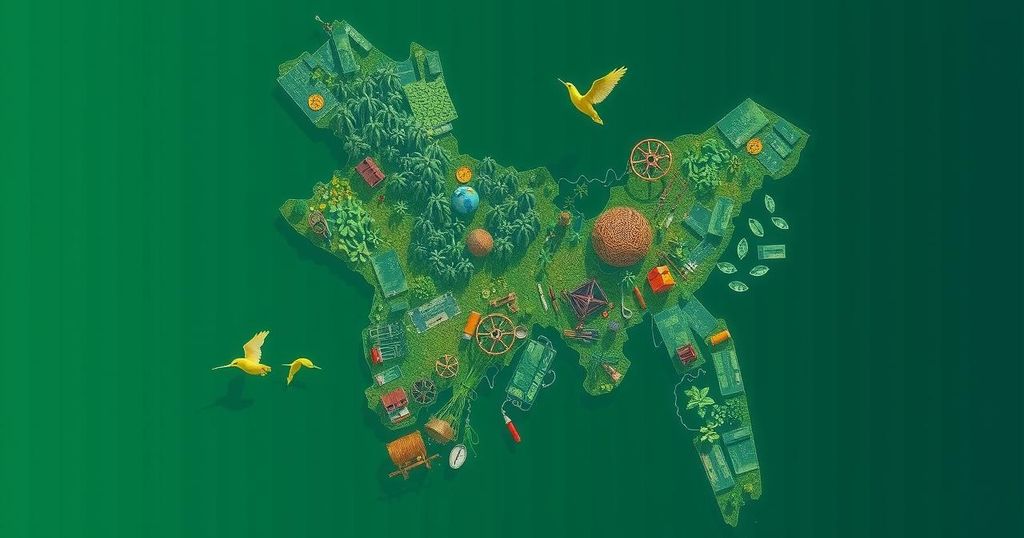Climate Apartheid in Bangladesh: A Call to Acknowledgment and Action

This article outlines the severe impacts of climate change on Bangladesh, as ranked ninth in global climate disaster risk. Projected losses in arable land and food security threaten its population, highlighting the inequities of climate impacts that favor wealthier nations. The concept of climate apartheid underscores the urgent need for policy reform and international support, as Bangladesh faces increasing environmental crises that demand immediate attention.
Bangladesh, facing significant challenges from climate change, is currently experiencing dire consequences, including relentless rain, devastating flash floods, and environmental migration. According to the World Risk Index 2023, Bangladesh ranks ninth in global climate disaster risk, with projections indicating a loss of 30% of its arable land by 2050 due to rising sea levels. This poses a grave threat to food security, particularly rice production, which is a staple for the population, and the country’s overall territory is expected to diminish by 17%. Given its heavy reliance on agriculture amidst an overpopulated society, such circumstances threaten to exacerbate unemployment, housing instability, and poverty. Despite being one of the least contributors to global greenhouse gas emissions since its independence in 1971, Bangladesh is bearing the brunt of climate crisis impacts. The melting of Himalayan glaciers further threatens its river systems, resulting in significant flooding. Yet, the Bangladeshi government has been slow to implement effective policies to address these environmental challenges, hampered by internal political instability and the larger context of climate politics dominated by wealthier nations. The notion of climate apartheid is becoming increasingly evident, as affluent nations retain the resources to shield themselves from climate-related disasters while exploiting poorer countries like Bangladesh, which suffer the consequences of historic colonialism and imperial exploitation. An illustrative example lies in the contrasting responses to recent floods, where wealthier areas received substantial aid, whereas others remained largely neglected. It is critical to recognize that the burdens of climate change are not distributed equally. The developed Global North has been responsible for the majority of greenhouse gas emissions over the past two centuries while shifting the responsibility for climate solutions onto developing countries. This hypocrisy is aggravated by the prioritization of economic growth in the Global South, as nations face pressures to industrialize while lacking the necessary financial and technological support to do so. In light of the ongoing humanitarian crisis projected to result in the deaths of 250,000 people each year from 2030 to 2050 due to climate impacts, it is imperative for Bangladesh to elevate climate change to the forefront of its national agenda. Immediate action and prioritization of climate policy are vital for safeguarding the future of its vulnerable population.
The article addresses the pressing concerns surrounding climate change in Bangladesh, a country identified as one of the most vulnerable to climate disasters according to the World Risk Index. The projections indicate substantial loss of arable land and significant threats to food security, stemming from rising sea levels and environmental degradation. Given its historical contributions to greenhouse gas emissions, Bangladesh’s situation highlights the disparities in how climate impacts are felt worldwide, particularly between wealthier nations and poorer countries. The concept of climate apartheid is presented, illustrating the unequal distribution of resources and support that exacerbate the crisis faced by nations like Bangladesh.
In conclusion, Bangladesh stands at a critical juncture, grappling with the realities of climate change that disproportionately affect its population despite their minimal contributions to the problem. The urgent need for action, comprehensive policies, and equitable support from the Global North is paramount, recognizing that the fight against climate change is fundamentally a human rights issue. As challenges increase, the government must prioritize climate resilience to ensure the survival and well-being of its citizens.
Original Source: asianews.network






